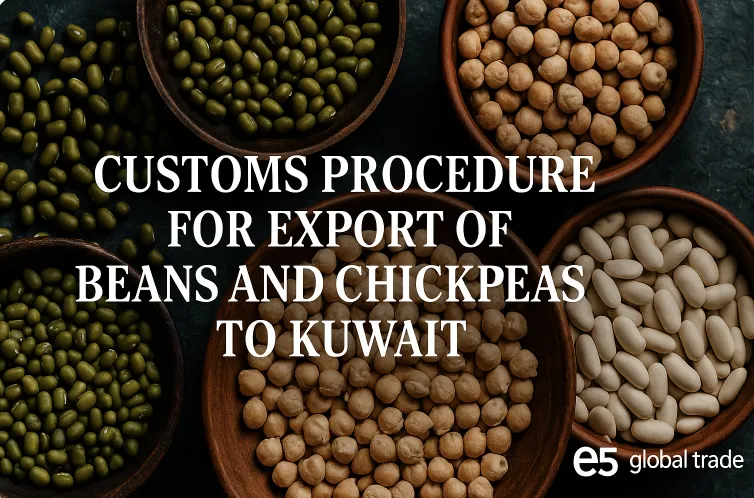Customs Procedure for Bean and Chickpea Exports to Kuwait: Despite its small geographical location in the Middle East, Kuwait, with its high income level and import-based food system, is one of the region's major markets. Dried legumes, in particular, are a cornerstone of the daily diet. Beans and chickpeas are consumed extensively in both homes and institutional kitchens. However, because local production cannot meet this demand, Kuwait imports millions of tons of beans and chickpeas annually. This creates a significant export opportunity, especially for products originating in Turkey. However, producing quality products is not enough. Success is achieved through the implementation of proper customs procedures. The first step in exporting beans and chickpeas to Kuwait is to comply with the rules established by the Kuwait Food Safety Department (Kuwait Municipality). This department oversees all food imports and ensures that every product is hygienic, safe, and packaged appropriately. The export process proceeds in the following steps: First, a certificate of origin is required. This document proves that the product was produced in Turkey and approved by local authorities. The document is issued by the Ministry of Trade or the relevant certification body. Secondly, a health certificate is required. This certificate demonstrates that the product is suitable for human consumption, the aflatoxin level is within acceptable limits, and it does not contain foreign matter. The certificate is issued by the Ministry of Food, Agriculture and Livestock or authorized laboratories. Thirdly, a HALAL certificate is mandatory. All food products in the Kuwaiti market are expected to be halal. This certificate is issued in Turkey by the Presidency of Religious Affairs or internationally recognized halal certification organizations (e.g., TÜRCERT, IMO Control). The certificate must be in Arabic or English. The fourth important document is the commercial invoice. This invoice details the type of product, quantity, unit price, total amount, and payment terms. The invoice must include the full addresses and tax numbers of the exporter and importer. The fifth document is the packing list, which contains information such as the number of packages, net gross weight, and batch number of the product in each container. The sixth document is the Bill of Lading. For sea shipments, this document, issued by the carrier, indicates the product's route, delivery point, and transportation conditions. For air shipments, an air waybill is used. Seventh, the customs declaration is prepared by the importer or their customs broker on the Kuwaiti side. All the above documents are attached to this declaration. A physical inspection may be conducted upon entry to the Kuwaiti port. In particular, the packaging is checked for damage, humidity level, and label information. The label must include the product name, origin, net quantity, shelf life, and the importer's information in Arabic. The eighth step is to pay customs duties. The customs duty rate for dried legumes in Kuwait is low. However, this rate can change from time to time. The importer pays VAT and additional fees based on the declared value. This process is generally completed within 1-3 business days. Turkey has a significant advantage in logistics. Products shipped by container from Mersin or Iskenderun to Shuwaih Port reach the port of Shuwaih within 10 to 14 days. This timeframe is significantly shorter than that of Asian competitors. Sample shipment by air can be completed in 2 to 3 days. E5 Global Trade determines the most suitable logistics model (EXW FOB CIF DAP), expedites customs procedures, and monitors the delivery process on a rolling basis. Distribution channels are diverse. Instead of selling directly to consumers, most producers enter markets through a Kuwaiti-based distributor. This partner handles product customs clearance, warehouses, distributes, and provides customer service. E5 Global Trade connects producers with these partners, manages contract processes, and ensures payment security. Ultimately, customs clearance for bean and chickpea exports to Kuwait is achieved not only through documentation but also through proper process management. E5 Global Trade is a partner who demonstrates that producers are not alone in this journey. Because true trade is much more than just shipping products.
E5 Global Trade | Yazılar
Customs Procedure for Bean and Chickpea Exports to Kuwait


